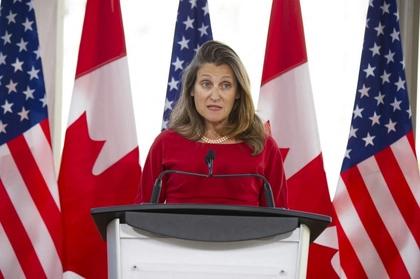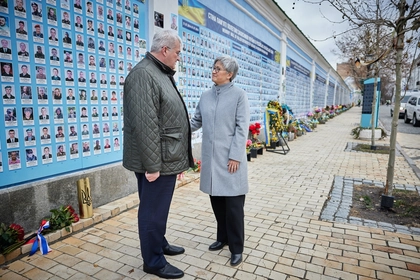In late August, Russian President Vladimir Putin paid an unannounced visit to Chechnya – marking his first trip there since 2011. It is no coincidence that he headed to Russia’s “Wild West” mere weeks after the Armed Forces of Ukraine (AFU) made a bold incursion into Kursk.
Hesitant to conduct another nationwide enlistment drive that would risk further alienating the already downtrodden Russian masses, Putin instead zeroed in on Chechnya for additional cannon fodder. By soliciting its head, Ramzan Kadyrov, Putin sees it possible to field a seemingly endless supply of pliant, bloodthirsty combatants with no regard for rules of engagement or basic human decency.
JOIN US ON TELEGRAM
Follow our coverage of the war on the @Kyivpost_official.
What sets these “TikTok” soldiers apart from the conventional Russian Armed Forces is that they are religiously inculcated to martyr themselves for a “noble cause.” In his recent pep talk to frontline-bound Kadyrovites, Putin hammered home the fallacy that Russia faces an existential threat to its very survival and how “absolutely invincible men like them” are duty-bound to “protect the fatherland”. Major General Apti Alaudinov, who serves as commander of the Akhmat Battalion, doubled down by reassuring the parents of conscripted Chechen reservists that their children “will go to heaven” if they perish in Kursk.
Since the onset of his “special military operation,” Putin has pulled several tawdry PR stunts to curry favor with the Organisation of Islamic Cooperation (OIC). This includes kissing the Quran while in Grozny; levying treason charges against 20-year-old Volgograd resident Nikita Zhuravel for desecrating it; allowing Russian women to sport headscarves in passport photos; throwing his weight behind Palestine amid the ongoing Gaza conflict; not to mention shying away from condemning Kadyrov’s teenage son Adam after he was filmed roughing up a defenseless Zhuravel at a pre-trial detention facility last autumn.

Canada’s Chrystia Freeland – A Personal View
Rather, Adam Kadyrov was afforded rockstar-like treatment for “defending the honor of his religion” and showered with a slew of accolades – most notably the Hero of Chechnya title and Order of Duslyk conferred on him by the Tatarstan leader Rustam Minnikhanov. At just 15, he had also been appointed the youngest ever chief of Chechnya’s security services and, more recently, the “curator” of a special forces training university in Gudermes. Meanwhile, his elder brother and presumptive heir apparent, Akhmat, held a tête-à-tête with Putin in March 2023, when rumors surrounding their father’s failing health began to surface.
Indispensable asset
The Kremlin has a vested interest in seeing to it that the stewardship of Chechnya stays within the tried and tested Kadyrov clan, however ill-prepared the current incumbent’s hand-picked successor may be to pick up the mantle. As far as Putin is concerned, predictably and continuity trump competence in a republic still considered Russia’s problem child. Institutionalizing a Gulf Cooperation Council (GCC)-style hereditary family dictatorship is a means of ensuring Grozny remains blindly allegiant to Moscow, despite the groundswell of animus towards “United Russia” at the grassroots level prompting separatist Chechen volunteers to take up arms for Ukraine.
Among the reasons why Middle Eastern and North African jurisdictions have overwhelmingly sided with the aggressor is the widespread misconception that Islamophobia is far less acute – if at all prevalent – in Russia relative to the West. In stark contrast to the dog-whistle politics and scorched-earth decimation of Chechnya that followed the 1999 Moscow apartment bombings, Putin demonstrated much greater restraint in the wake of the Crocus City Hall massacre and Dagestan terror attacks earlier this year. He held back for fear of whipping up faith-based bigotry and losing face in the eyes of Russia’s newfound OIC allies.
That said, the Kremlin has made common cause with Muslim-majority states at the expense of its own Jewish community. It is worth recalling that prior to the synagogue shooting in Derbent in June, there was an attempted pogrom against Israeli passengers at Makhachkala’s Utyash Airport once a local mob caught wind of their incoming flight from Tel Aviv. Moreover, the roughly 65,000 dual nationals who left Russia for Israel in 2022 and now find themselves stuck between a rock and a hard place have suggested that they have no intention of returning to a country whose top brass is fanning the flames of antisemitism.
Ramzan Kadyrov, on the other hand, made no bones about his soft spot for Hamas – even going so far as to glorify the sadistic atrocities they committed on Oct. 7 2023 and proposing to send troops to defend Palestine when the regional war first broke out. With a 30 million-strong indigenous Muslim population and given its frantic quest to win over the Ummah, the Russian government figured that it stood to benefit from adopting a similarly pro-Palestinian stance and pushing for an illusory two-state solution. Needless to say, their “no limits” strategic partner China arrived at the same conclusion albeit for different reasons.
When it comes to strengthening bilateral ties with the Arab League and, in particular, the Persian Gulf petrostates, Kadyrov has proven to be an indispensable asset. On a first-name basis with the Saudi and Emirati rulers, he will emerge all the more useful to Moscow in the event that Republican nominee Donald Trump is re-elected and exerts pressure on the oil-rich sheikhdoms to “drill baby drill”. After all, high energy prices are keeping Russia’s wartime economy afloat. Any US-led effort to ramp up crude production could bite into the Kremlin’s national budget and hamper its ability to carry on playing the long game in Ukraine.
Besides serving as Russia’s de facto emissary to West Asia, Kadyrov’s capacity to press-gang able-bodied Chechens at scale and without any pushback has created a manpower surplus in his fiefdom. Having already dispatched over 47,000 fighters to Ukraine, it is likely that Putin will call upon him and Alaudinov to mobilize “peacekeepers” to neighboring Georgia should the ruling Georgian Dream party be voted back into office and a South Caucasus edition of Euromaidan ensue. Make no mistake, Kadyrov is fully aware of the extent to which the tables have turned and will, sooner or later, demand that Putin juice up their existing social contract.
The views expressed are the author’s and not necessarily of Kyiv Post.
You can also highlight the text and press Ctrl + Enter






